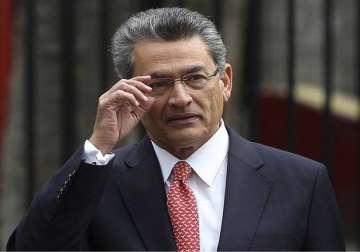U.S. apex court denies Rajat Gupta's appeal against lifetime ban
New York: The U.S. Supreme Court has denied an appeal by India-born former Goldman Sachs Director Rajat Gupta, who had challenged a ruling by a lower court permanently banning him from serving as an officer

New York: The U.S. Supreme Court has denied an appeal by India-born former Goldman Sachs Director Rajat Gupta, who had challenged a ruling by a lower court permanently banning him from serving as an officer or director of a public company.
In the Supreme Court order issued on Monday, Mr. Gupta's certiorari was denied, in effect keeping intact the ruling made by the U.S. Court of Appeals for the 2nd Circuit last year which had imposed a permanent injunction prohibiting the former McKinsey head from serving as an officer or director of a public company, associating with brokers, dealers, or investment advisors, and further violating securities law.
The IIT-educated Mr. Gupta is currently serving a two-year prison term on insider trading in Ayer, Massachusetts.
The ruling by the Supreme Court was made in a parallel civil insider trading case brought against Mr. Gupta by federal regulator Securities and Exchange Commission.
A three-judge bench of the Appeals Court had in June last year denied Mr. Gupta's plea to overturn the decision of the district court that had permanently barred him from serving as an officer or director of a public company and associating with brokers, dealers, or investment advisors.
The appeals court had also upheld the decision by the district court that Mr. Gupta had to pay $13.9 million as penalty in the U.S. Securities and Exchange Commission's insider trading case. The $13.9 million civil fine was not at issue in the Supreme Court appeal and Mr. Gupta's appeal of his criminal conviction is still pending at the Supreme Court.
Mr. Gupta has also been ordered to pay a $five million fine in the criminal case and $6.2 million restitution to Goldman Sachs.
In denying Mr. Gupta's appeal, the second circuit court had said it finds “no abuse of discretion” in the imposition of injunctive relief and civil penalties on him by the district court.
“We have considered Gupta's remaining arguments and find them to be without merit. Accordingly, we affirm the judgment of the district court,” the three-judge panel had said.
Mr. Gupta had been fighting with all his might to reverse his insider trading conviction and avoid going to jail. He began his prison sentence after fighting a protracted legal battle to clear his name in one of the biggest insider trading schemes in U.S. history.
The appeals court judges had also said that the district court reasonably concluded that 66-year-old “Gupta remains well-placed to repeat his misconduct in the future.”
They added that the district court also was not wrong in imposing the treble civil penalty since “a tippee's gains and losses avoided are ‘attributable to the tipper, regardless whether benefit accrues to the tipper'.
“The district court considered the relevant factors, including the egregiousness of Mr. Gupta's conduct and reasonably concluded that imposition of the maximum allowable civil penalty was appropriate,” the appeals judges said.
Mr. Gupta has been assigned to the minimum security satellite camp near federal prison, where his former business associate hedge fund founder Raj Rajaratnam is currently serving his 11-year jail term on insider trading conviction.
He was convicted in 2012 after a jury trial of passing confidential information about Goldman Sachs to Mr. Rajaratnam just minutes after he learned about them at the financial giant's board meetings.
The SEC contends that a treble civil penalty is warranted because Mr. Gupta's tips to Mr. Rajaratnam “'resulted, in effect, in millions of dollars of losses to those who traded their stock without the benefit of Mr. Gupta's inside information.'”
Mr. Gupta's lawyers have argued that he did not accrue any “direct financial benefit” from the insider trading offenses and yet he has been ordered to pay a “heavy price”.